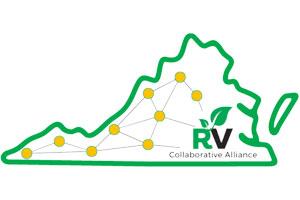Written by Brendle Wolfe, RVCA Coordinator
Celebrating the First Year of the Resilient Virginia Collaborative Alliance

Fall 2023
In the Fall of 2023, Resilient Virginia began the formulation of a regional climate collaborative for Central and Southwest Virginia, called Resilient Virginia Collaborative Alliance (RVCA). Building off a needs assessment and research dating back from 2021, this effort was created to bring cross sector partnerships together to facilitate climate adaptation and mitigation strategies, facilitate rural to urban connections, encourage peer exchange, and increase resource sharing among nontraditional partners.
Historically, climate collaboratives in the Commonwealth of Virginia have mainly been focused on coastal areas of the state. Additionally, while many localities have climate action plans, there was no coordinated regional climate collaborative effort focused in the non-coastal, southwestern and central portion of the state that was cross-sector in nature. This particular region is rural in many ways and significantly less populated than other parts of the state. All of these factors have created limited capacity for localities due to limited resources, understaffing, technical support, and overall lack of general funding to allocate towards climate resiliency efforts.
2024-Present
The recent fallout from the tragic natural disasters of Hurricane Helene across much of Western North Carolina, Tennessee, and portions of Southwest Virginia has made it all the more evident that uncertainties due to climate change impacts pose significant challenges for rural communities across the region that need to be urgently addressed. RVCA seeks to fill in the gaps and create a stronger region that can more robustly bound back from climate impacts in the future. RVCA, with support from a steering committee, has worked to establish a mission, identify direction, and create action plans for moving the region forward.
In the spring of 2024, RVCA was able to survey 14 local planning district commissions to identify where they are in resiliency and climate hazard planning and implementation to date. Since the survey, RVCA has been endeavoring to establish working groups ranging from clean transportation, water infrastructure, and agriculture, bringing together cross-sector stakeholders within the work groups to create further alignment and direction for a regional collaborative.
Guided by the steering committee and working groups, RVCA has since been able to convene all stakeholders together for a priority setting meeting, which took place September 25, 2024, and, through a facilitated interactive process, targeted efforts to plan, develop and implement a regional roadmap for climate resiliency.
2025-Forward
Moving forward into 2025-2026, RVCA is working to build partnerships, expand PDC survey efforts and assessments, create a space for enhanced peer exchange, bring resources to underserved localities, and manage pass through grant funding opportunities for regional partners. RVCA’s goal is to further develop synergy among diverse stakeholders that creates actionable, transformational change and expands the overall positive collective impact for a unique region of Central Virginia and Appalachia.
Critical to moving forward with our goals and programs, RVCA is also seeking funding support and actively seeking public and private sponsorships. If you are interested in getting involved with this regional collaborative, whether as a member of the working groups, helping to shape the regional roadmap, or as a supporter, please reach out to Brendle Wolfe at rvca@resilientvirginia.org. You can find out more about RVCA’s activities on the Resilient Virginia website.




